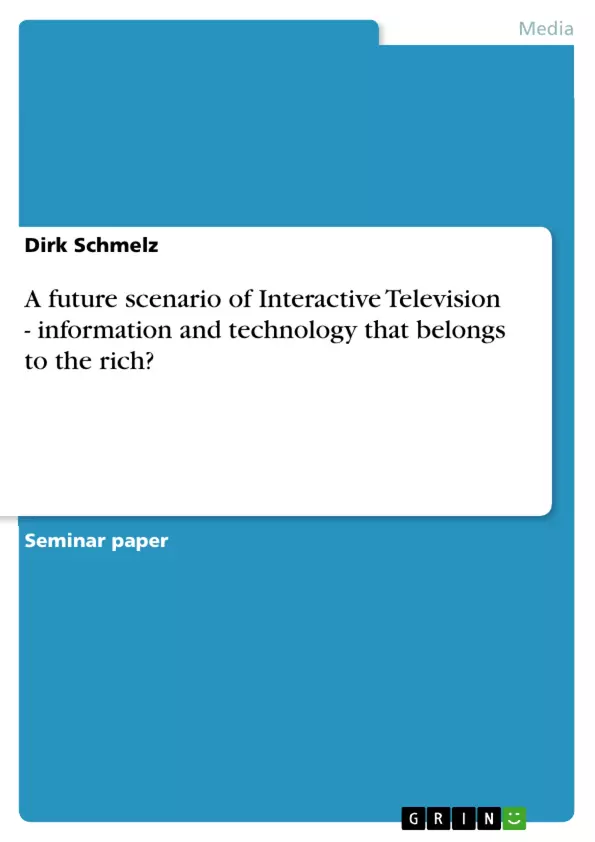In the following l want to discuss the effects the interactive television technology might have on the ′Information society′ and which tasks have to be fulfilled to become a member of it.
l want to focus on the question, what are the advantages to be a ′member′ of such a society and what advantages these technologies offer? My task is not to find a definite answer to these questions. They must be seen as speculative ones. All the new communication technologies like interactive television, are just at the beginning of its ′booming′ development and there is no empirical research done on it yet. However, want to take the interactive television technology as an example to discuss, what opportunities this new technology offers. Therefore, my work is primarily a theoretical approach to an issue that will become even more important if the new System will knock on the door of private households in Europe.
l also want to discuss some ideas of Bertolt Brecht, who already in the 1920′s made suggestions for interactive broadcasting, which were primarily concerned about the radio system. But nevertheless his ideas are still applicable on any other communication system. His ideas of interactivity are more relevant than ever.1 The industry took on this argument for their own purposes. They Claim, that interactive television is absolutely necessary, because the Computer generation is raised with interactivity. Video games are one the best examples for interactivity.
As well as the latest information l collected from newspapers, l will also use magazines and other media.
Table of Contents
- Introduction
- Access to the Systems
- The Future Scenery
- Pay TV and Video on Demand
- Possibilities of Control
- The Perceivers Expectations
- Expensive Information
- The Protection and the Value of Information
- Alternatives to Interactive Television
- Conclusion
Objectives and Key Themes
This work aims to explore the potential impact of interactive television technology on the development of an "Information Society." It examines the accessibility, cost, and potential advantages and disadvantages of participating in such a society, using interactive television as a case study. The primary focus is on understanding the opportunities and challenges this technology presents, particularly considering the financial and knowledge barriers to entry.- The role of interactive television in shaping an "Information Society"
- The accessibility and affordability of interactive television for different social groups
- The potential advantages and disadvantages of participating in an "Information Society"
- The influence of knowledge and financial resources on access to information technologies
- The concept of interactivity in media and its potential impact on communication systems
Chapter Summaries
- Introduction: This chapter sets the stage by discussing the growing importance of new media systems and the potential revolution in information access they promise. It highlights the potential benefits of readily available information but also raises concerns about the high cost of participating in these systems and the potential for social stratification.
- Access to the Systems: This chapter focuses on the internet as a prime example of an interactive digital communication system. It traces the evolution of the internet from its origins within the Pentagon to its widespread adoption by universities and now the general public. It emphasizes the role of knowledge and financial resources in determining access and explores the complexities of navigating the system.
Keywords
This work examines the evolving concept of an "Information Society," focusing on interactive television as a key technology. It explores themes of accessibility, affordability, social stratification, and the role of knowledge and finance in accessing information. The work draws on insights from media theory, examining the potential impact of interactive technologies on communication systems, and the concept of interactivity.- Citar trabajo
- International Master of Arts Dirk Schmelz (Autor), 1994, A future scenario of Interactive Television - information and technology that belongs to the rich?, Múnich, GRIN Verlag, https://www.grin.com/document/107841



